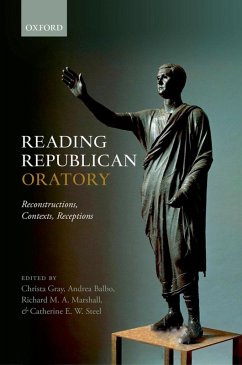
Epicurean Ethics in Horace (eBook, ePUB)
The Psychology of Satire
Versandkostenfrei!
Sofort per Download lieferbar
42,95 €
inkl. MwSt.
Weitere Ausgaben:

PAYBACK Punkte
21 °P sammeln!
Over the centuries leading up to their composition many genres and authors have emerged as influences on Horace's Satires, which in turn has led to a wide variety of scholarly interpretations. This study aims to expand the existing dialogue by exploring further the intersection of ancient satire and ethics, focusing on the moral tradition of Epicureanism through the lens of one source in particular: Philodemus of Gadara. Philodemus was an Epicurean philosopher who wrote for a Roman audience and was one of Horace's contemporaries and neighbours in Italy. His works, which were preserved by the e...
Over the centuries leading up to their composition many genres and authors have emerged as influences on Horace's Satires, which in turn has led to a wide variety of scholarly interpretations. This study aims to expand the existing dialogue by exploring further the intersection of ancient satire and ethics, focusing on the moral tradition of Epicureanism through the lens of one source in particular: Philodemus of Gadara. Philodemus was an Epicurean philosopher who wrote for a Roman audience and was one of Horace's contemporaries and neighbours in Italy. His works, which were preserved by the eruption of Vesuvius in AD 79 but have nevertheless not been widely read on account of their fragmentary nature, feature a range of ethical treatises on subjects including patronage, friendship, flattery, frankness, poverty, and wealth. Epicurean Ethics in Horace: The Psychology of Satire offers a serious consideration of the role of Philodemus' Epicurean teachings in Horace's Satires and argues that the central concerns of the philosopher's work not only lie at the heart of the poet's criticisms of Roman society and its shortcomings, but also lend to the collection a certain coherence and overall unity in its underlying convictions. The result is a ground-breaking study of the deep and pervasive influence of Epicurean ethical philosophy on Horace's Satires, which also reveals something of the poet behind the literary mask or persona by demonstrating the philosophical consistency of his position throughout the two books.
Dieser Download kann aus rechtlichen Gründen nur mit Rechnungsadresse in A, B, BG, CY, CZ, D, DK, EW, E, FIN, F, GR, HR, H, IRL, I, LT, L, LR, M, NL, PL, P, R, S, SLO, SK ausgeliefert werden.













